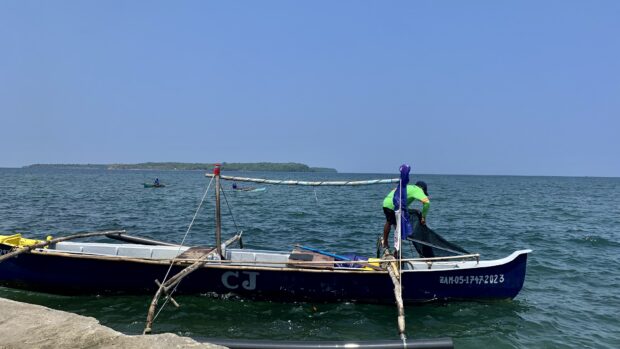
Fishermen in Masinloc town, Zambales province prepare to sail in the municipal waters. They are still reluctant to go back to their usual fishing ground on Scarborough Shoal because of the presence of the Chinese Coast Guards. | PHOTO: INQUIRER.net / Joanna Rose Aglibot
SAN ANTONIO, Zambales — The fisherfolk group Pamalakaya Luzon on Wednesday reiterated its call for the government to completely reject Beijing’s unilateral fishing ban covering the country’s territorial waters.
Bobby Roldan, vice chair of Pamalakaya for Luzon, told the Inquirer that there should be no room for any compromise, not even coordination on fishing activities, that could embolden China to become more entitled over the country’s territory.
“No amount of alternative source of income could equal the fishing livelihood of Filipinos in the resource-rich West Philippine Sea and its significant contribution to our local food security,” said Roldan.
Roldan also reminded the government that China “has no moral ascendancy to impose a fishing ban on the pretext of marine conservation,” noting that China is the one “destroying our marine biodiversity and ecosystem through massive reclamation, illegal poaching, and industrial fishing expeditions.”
“If there’s something that should be permanently banned in our waters, it must be China’s destructive activities,” Roldan added.
On Tuesday, President Marcos told reporters in Quezon City that Manila and Beijing were making some progress toward a breakthrough in resolving their dispute over China’s annual fishing ban in the West Philippine Sea, which had been the bane of Filipino fishermen for over two decades.
Marcos said the two sides had reached the point of having “coordination” on fishing activities despite China’s unilateral imposition of a fishing ban in the resource-rich waterway.
Since 1999, Beijing has imposed a yearly fishing ban in the vast South China Sea, including the West Philippine Sea, or the parts within the country’s 370-kilometer exclusive economic zone (EEZ), despite a 2016 arbitral ruling recognizing the Philippines’ sovereign right to fish and explore for resources in those waters. INQ
RELATED STORIES
PH, China make headway on ‘fishing ban’ – Marcos
Zambales fisherfolk resist China’s fishing ban | Inquirer News
Pamalakaya urges gov’t to protest ‘China Coast Guard Law’ after Chinese …